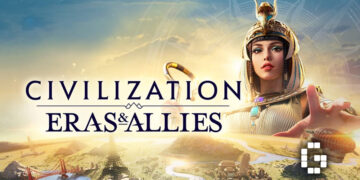We were invited by 2K Games to Singapore for a hands-on experience with Firaxis Games’ next entry in the Civilization series, Civilization VII. For a total gameplay of three hours we got a good preview what Civilization VII has to offer. Set to release on February 11, 2025, with Early Access beginning February 6, this latest installment introduces revolutionary changes to the beloved 4X strategy franchise while maintaining its core empire-building essence. From revised gameplay mechanics to stunning visual upgrades, this upcoming installment promises to redefine what players can expect from the series.

Revolutionary Three-Age System
One of the most significant innovations in Civilization VII is the introduction of the Three-Age system, which divides gameplay into Antiquity, Exploration, and Modern Ages. During our playthrough, we experienced the transition from Antiquity to Exploration Age, which took approximately three hours to reach the midpoint of the Exploration Age. The progression felt seamless yet transformative, introducing new strategic elements at each stage. Each age introduces unique mechanics, buildings, and challenges, ensuring that the experience evolves as players progress through history. The system bears some similarity to the Golden Ages or Dark Ages system from Civilization VI, but with a more profound impact on gameplay progression.


Dynamic Civilization Evolution
Perhaps the most interesting change is the new civilization progression mechanic. Players must select different civilizations as they advance through ages, creating a unique historical lineage. In our session, we began as Augustus leading the Roman Empire in the Antiquity Age, then transitioned to the Spanish Empire during the Exploration Age. When advancing to a new age, players choose from several civilization options – some freely available, while others require meeting specific conditions during the previous age. For instance, having three Animal Farms during the Antiquity Era might unlock access to a particular civilization choice. While this mix-and-match system offers unprecedented replayability and adaptability, longtime fans might miss the traditional approach of maintaining a single civilization throughout the game. The system carries forward key elements from previous ages, allowing players to create their own unique historical narrative.


Commander System: Streamlined Military Management
Combat has received a substantial overhaul with the introduction of Commanders. These specialized units feature skill trees and can “stack” nearby units, streamlining army movement and reducing micromanagement. Commanders provide various buffs through their skill trees, such as movement bonuses, combat strength enhancements for defensive positions, and the ability to generate gold from packed units. The system allows units to be unpacked and deployed to adjacent tiles for attacks or defense, eliminating the need to move individual units. Additional skills include allowing units to move immediately after unpacking and ignoring terrain movement restrictions. This addition brings more strategic depth to military engagements while making army management more accessible.


Reimagined Diplomacy
The diplomatic system has been revamped with the introduction of “Influence” as a currency. Rather than traditional gold-based trading, players use Influence points to improve relationships and conduct diplomatic actions. Leaders can respond to diplomatic initiatives in three ways: Support, Accept, or Reject, each with its own strategic implications and Influence costs. Influence accumulates each turn and can be spent on various actions, including mutually beneficial agreements, negative actions against other empires, utility options like Open Borders or Improve Trade Relations, and espionage activities such as Steal Technology. While Support and Reject responses require Influence expenditure, Accept comes at no cost. This system creates a more interactive and engaging diplomatic experience, though some players might find themselves accumulating excess gold with fewer traditional trading options.


Natural Disasters: A Return with Impact
Building upon Civilization VI: Gathering Storm’s foundation, natural disasters play a more prominent role in Civilization VII. During our three-hour session, we encountered multiple flooding events near our river settlements, adding an extra layer of strategic consideration to city placement and development. The disaster system includes various events from volcanic eruptions to tsunamis, each presenting unique challenges and opportunities. These events are not only visually impressive but also force players to make critical decisions about rebuilding, relocating, or preparing for future disasters, adding an unpredictable yet engaging element to the gameplay.


Accessibility and Initial Impressions
Civilization VII will be available across multiple platforms, including PC (Steam, Epic Games Store), Linux, Mac, Xbox Series X|S, Xbox One, PlayStation 5, PlayStation 4, and Nintendo Switch. The game features cross-play support between PC and consoles, allowing friends to compete regardless of platform choice. The developers have implemented an overhauled tutorial experience and refined gameplay systems to make the game more accessible to newcomers while maintaining depth for veteran players. Multiplayer options include both epic multi-Age campaigns and single-Age sessions for shorter gameplay experiences.

From our hands-on experience, Civilization VII represents a bold direction for the series. While the new features may divide veteran players, particularly regarding the forced civilization changes between ages, they undoubtedly add fresh strategic depth and replayability. The streamlined military management and enhanced diplomatic systems show promise in modernizing the classic 4X formula while maintaining its strategic complexity.

The game’s lower entry barrier compared to previous entries makes it an attractive option for newcomers, though series veterans might find some of the simplified mechanics and forced civilization changes controversial. Regardless, the comprehensive improvements and innovative features make Civilization VII a title worth watching when it launches in February 2025.






![[ASIA EXCLUSIVE] Bringing Back a Classic: Inside the Making of FINAL FANTASY TACTICS – The Ivalice Chronicles](https://cdn.gamerbraves.com/2025/06/FFT-Ivalice-Chronicles_Interview_FI2-360x180.jpg)





![[EXCLUSIVE] Gearbox Executives Share Details on Borderlands 4 – Story, Weapons, and Lessons Learned](https://cdn.gamerbraves.com/2025/06/Borderlands-4_Interview_FI-360x180.jpg)
![[EXCLUSIVE] Wan Hazmer Reveals How No Straight Roads 2 Expands Beyond Vinyl City with Shueisha Games](https://cdn.gamerbraves.com/2025/06/NSR2_Interview_FI-360x180.jpg)













